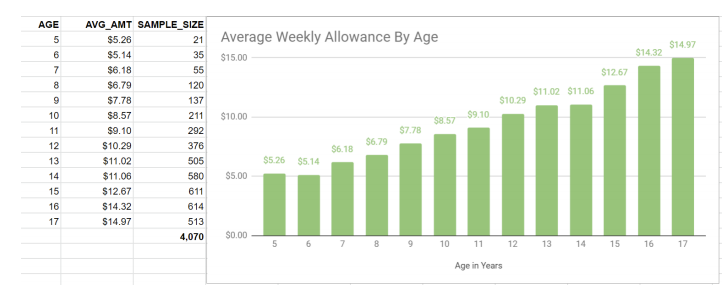Should kids get an allowance or shouldn’t they? There are a few different opinions on the subject, and as the mother of four kids, I’m going to share my thoughts on this often heated debate.
The average allowance is between $5 and $15 per week. How much you give will likely depend on age and other responsibilities. How they earn the money will also be a factor. Do they need to do chores or do they get the money “just because?”
Table of Contents
- What Constitutes an Allowance?
- What about Chores and Allowance?
- Work-for-Pay or Commission-Based “Allowances”
- A New Money Mindset
- What is the Average Allowance for Kids and Teenagers
- How to Decide if You Should Give Your Kids an Allowance
- What is the Purpose of the Allowance?
- What Type of Allowance Allotment Fits into Your Budget?
- Determine What Must be Done to Earn the Allowance
- Conclusion
What Constitutes an Allowance?
So, what exactly constitutes an allowance? Well, Merriam Webster defines it as “a sum regularly provided for personal or household expenses”.
Parents might call an allowance:
- Money I give my kid for the completion of chores
- A regular sum of money given “just because”
- Money for my kid to have to spend on what they need
Whatever you call it, we know that allowance involves handing over some of your hard-earned cash to your kid. While some parents might find that a fabulous idea, others might view it as a handout that will lead to a sense of entitlement.
Some parents fear that an allowance might give kids the idea that they deserve to get paid every time they help around the house.
If you decide that your kids’ weekly allowance is distributed with no strings attached, that could lead to a sense of entitlement. The risk of that happening may vary based on the particular personality of the child and on how much you give them.
For instance, $5 a week as a no-strings-attached handout probably won’t make your kid feel terribly entitled. That’s not a lot of cash for most kids, and it’s not going to turn them into an extravagant spender.
Larger amounts for allowance could be a problem. For instance, if you’re handing your kid $100 a week with no strings attached they could get used to living a more spendthrifty lifestyle.
But what if there are stipulations attached to the allowance?
What about Chores and Allowance?
Some parents tie a kid’s allowance to the completion of chores. When I was a kid, my mom gave me and my brothers a small sum of money each, every single week.
But there was a caveat: the money was tied to us having completed a list of weekly chores. The chore list wasn’t terrible: clean our rooms each week and clean one other room as assigned, usually on Saturday morning.
If we didn’t get the chores done we wouldn’t get our allowance. Plain and simple. I pretty much always did my chores because I wanted that cash. I wanted to be able to hit up the vending machine at school, hit the Taco Bell drive-thru with my friends, and save some money to buy clothes.
I wasn’t old enough yet to have a job, so the allowance was the only money I had access to.
My little brothers didn’t have those same motivations to get cash as I did. So they’d often finish the week out without completing their chores. This would frustrate my mom and lead to her having to dole out additional disciplines so they’d do what they were told.
You can deduce from my mom’s story that it might just be easier to give your kid a weekly sum of cash with no strings attached. Or, you could try a work-for-pay program instead.
Work-for-Pay or Commission-Based “Allowances”
Another option is the commission option. Instead of an allowance, kids are given a list of commission-based chores they can do.
This is more what we do in my house. However, I combine it with “partnership” chores to avoid giving the kids the idea that I’ve got to pay them every time they help out around the house.
In my house (I’ve got four kids) we have a list of chores that rotate each week and for each kid.
On any given week, each kid is required to do their individual list of chores. This is a list of chores they do simply because they’re a part of our family. I explained to each of them years ago that they are a part of our family team, and that teammates work together to do what needs to be done.
The rotating list of chores are what they are required to do as a member of our team and without pay.
However, I also have a separate list of chores that they can do and get paid for – if they choose to.
The commission-based chores are chores such as:
- Occasional chores such as raking and bagging leaves
- Tedious chores such as organizing or decluttering a room
- Occasional deep cleaning chores, such as spring cleaning
- Other chores that don’t fall into typical house care, such as washing the vehicles
When it comes to these chores, I’ll have a designated pay rate for each chore. I usually give the kids a choice to take advantage of these opportunities. However, sometimes I run into the same problem my mom did where no one really wants the money so they won’t offer to take the job. In those cases, I will then assign the paid chores and dole out other punishments if they’re not completed.
A New Money Mindset
One thing that this combination type system has done for my kids is to give them a different money mindset. You see, in my house, I don’t often buy the kids non-necessities “just because”. I’m a single mom and need to keep a close eye on my budget.
Therefore, if they want clothes outside of our clothing budget, or want toys, games, or spending money outside of holiday or birthday gifts, they need to find a way to earn it.
They all know this, so they never simply ask me for money. Instead, they’ll say “Mom, is there something I can do to earn some cash? I need (x) amount of money for (whatever it is they want).”
This system has worked very well for our family. I don’t have kids coming to me for a handout. I don’t have to worry about giving one kid more cash than another. It’s a fair system that allows all of the kids to choose how much extra money they have to spend, save, or give to charity. This commission-based pay system might not work for every family. But for my kids, it’s given them a clear understanding of the need to work to earn money.
If you have little ones and want to start teaching them about money here is a list of great books.
What is the Average Allowance for Kids and Teenagers
According to FamZoo, the average allowance ranges from about $5 to $15 per week depending on the age of the child.
FamZoo is a chores app you can use to give your kids direct access to allowance or money earned from chores. There’s a debit card attached to your child’s FamZoo account that allows them to spend, save, give, or invest the money they’ve earned.

Check out our full review of FamZoo here.
As for your kids’ average allowance, I would venture to guess that depends on a lot of things. For instance, what is the cost of living in your area? If the cost of living in your area is higher than in the rest of the region, you might want to consider a larger allowance.
Also, do you expect them to take care of some things themselves? For example, if you expect them to buy themselves lunch at school each day then their allowance will be higher to accommodate that cost.
How to Decide if You Should Give Your Kids an Allowance
Whether or not an allowance is necessary or doable for your family depends on a few different factors. And of course, it depends on your personal decision as a parent. However, there are a few things you can think about when deciding whether or not to give your kids an allowance.
What is the Purpose of the Allowance?
One way to start the discussion is to decide what the purpose of the allowance is. Will it simply be an allotment to give your kids so they have some spending money of their own? Or do you have a purpose behind the allowance? Is it an incentive to get them to try their best in school? Is it a way to introduce them to the “work equals money” concept?
Or is it a means to help them learn how to manage and budget money in an effort to prepare them for adulthood? Figuring out the purpose of the allowance first will help you better determine the answer to these other two questions.
What Type of Allowance Allotment Fits into Your Budget?
Budget is an important factor when determining the “ifs” and “whats” of the allowance debate. Visit your budget to figure out how much fluid cash is available to pay out for allowances for your children.
From there, determine what the best way is to administer the allowance budget. Weekly? Monthly?
Finally, set standards as to what metrics must be met to earn the allowance.
Determine What Must be Done to Earn the Allowance
Once you decide to give your kids an allowance, you’ll want to determine what your child’s responsibility is to earn it. If it’s a sum of money given with no strings attached, tell them that.
However, if their allowance amount is tied to weekly chores, grade performance, or some other behavioral standard, make sure the rules are clear and concise.
That way if your child fails to meet the standards given you are justified in withholding their allowance. However, if they meet the requirements they are entitled to the money.
Setting clear standards before you start giving your child allowance will help you ensure you have a clear plan to follow. It will also help your child ensure they know what the rules are for earning their allowance.
Conclusion
An allowance can be a great tool for helping your kids learn a lot about life (and a good first step, followed by teaching them how to invest as teenagers). It can be used to learn about money management, hard work, and family contribution. When done right, giving your child an allowance can be a great way to prepare them for financial and work ethic maturity.
Do you give your kids an allowance? If so, what method of earning it did you use and how did that work for your family? We’d love to hear your thoughts in the comments section.




simply put–We give $5.00 a week and they MUST save 10 %
A good way to teach saving!
My children get paid to do chores that benefit the whole household. Bathrooms that everybody uses, vacuuming main floor, take out trash, etc. They don’t get paid for chores that they alone benefit from. Their own laundry their bathroom etc. The other rule is that they have to invest half of what they get. They both have a UTMA account at vanguard. They are investing in etf’s there. Every month they split their money and invest it and I give them a short age appropriate lesson on long term investing.
I like the separation – household chores vs. personal chores – and having them learn about investing at the same time is great too.